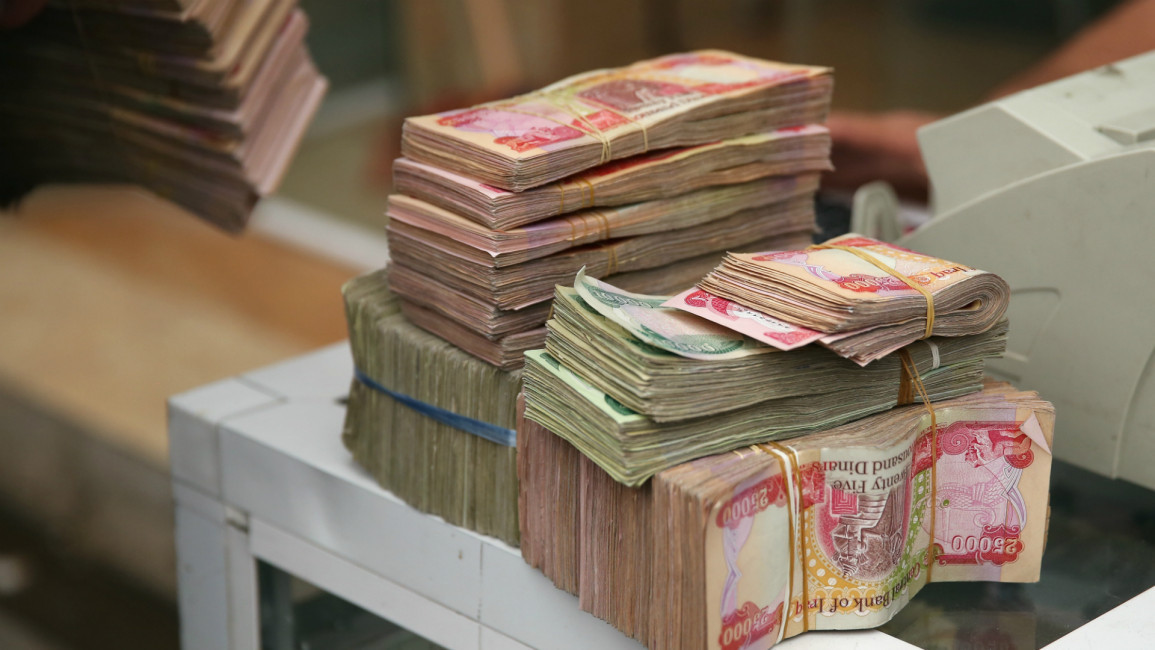Frustration mounts in Iraqi Kurdistan over delay of salary payments during Ramadan
Authorities in the Iraqi Kurdistan Region (IKR) are withholding the distribution of February salaries over the public sector employees over unreal justifications, creating outrage as people are desperate to purchase basic life needs during the holy Muslim month of Ramadan.
Iraq's Supreme Federal Court ruled on Wednesday, 23 February, that the KRG should hand over all oil and non-oil revenues to Baghdad. The court also obligated the Iraqi federal government to pay the salaries of the KRG civil servants, and the KRG should cooperate with Baghdad in this regard.
This move came after the KRG failed to distribute wages promptly and thoroughly, relying instead on multiple loans from the Iraqi federal government to meet its obligations.
Since 11 March, Iraq's finance ministry has transferred approximately 560 billion dinars to the KRG's bank account to cover the monthly salaries of the KRG civil servants, excluding the Kurdish security forces.
However, these salaries have yet to be dispersed. The KRG's finance ministry has stated that it requires around 950 billion dinars monthly to fulfil its obligations to civil servants.
The KRG's finance ministry did not send the formal payroll of Kurdish security forces, including peshmerga, police and local security forces, on the pretext that it would endanger the region's national security. Yet, it asked Baghdad to send some money to the Kurdish security forces.
"According to the decision by Iraq's top court, the Iraqi government should send payments for the KRG civil servants to federal banks in the Kurdistan region, but the KRG insists that the payments should be transferred into private banks in the region," Muthana Amin, Kurdish lawmaker in the Iraqi parliament from the Kurdistan Islamic Union (KIU) told The New Arab.
"In my opinion, the Kurdish authorities should start distributing salaries to the KRG employees and not withhold them any longer."
As the holy Muslim month of Ramadan quickly approaches, meats and basic foodstuff prices have skyrocketed across Iraq, prompting authorities to permit importing live cattle and penalising greedy traders and market owners https://t.co/48C0gnSZPL
— The New Arab (@The_NewArab) February 26, 2024
"The KRG has no excuses for not sending the formal payroll of the Kurdish security forces. If they do not send the payroll, and if I were the Iraqi PM, I would not send a penny to those forces. If you have formal forces, the payroll should be clear," he also stressed.
Amin anticipated that the pending financial issues between the KRG and the Iraqi federal government would be resolved within the coming months since the decision by Iraq's top court is binding on all authorities across the country.
Public sector employees are furious with the Kurdish authorities and accused them of stealing the payments that Baghdad has sent as salaries. The KRG's withholding of salaries has caused a significant recession in the local markets while the needs of people are increasing in the holy month of Ramadan.
The KRG advocates for federal payments to be routed through private sector banks in the region, which are predominantly owned by Kurdish ruling parties. This arrangement would result in significant financial gains for the parties, as they would earn millions of dollars each month by opening accounts for KRG employees. However, the Iraqi government opposes this proposal, citing its contradiction with a decision by Iraq's top court.
Muslim preachers across the region have rebuked the Kurdish authorities for not distributing the salaries. A main Kurdish opposition party has threatened to raise a complaint in Baghdad against the KRG, accusing the regional government of 'stealing' the payments that the federal government has sent.
In a statement, the KRG Council of Ministers said that the Iraqi government has only sent 59 per cent of the funds needed to pay the nearly 1200,000 people on the public payroll.
In September, teachers in Sulaimani and Halabja provinces initiated a strike due to unpaid wages, only returning to work fully in March following assurances from government officials to address their concerns.
Throughout 2023, Kurdistan Region civil servants received only nine monthly salaries; as of the new year, they have only been paid for January.
In 2014, Iraqi Kurdistan began exporting oil to Turkey independently, causing tension with Baghdad. The KRG needs 940 billion Iraqi dinars monthly to pay salaries for over 1.2 million civil servants. However, since 25 March 2023, Ankara halted importing 450,000 barrels from Kurdistan due to an international ruling favouring Baghdad's control over Iraqi oil exports. Consequently, the KRG relies on Baghdad to allocate its budget share for timely salary payments.
In June 2023, Iraq's parliament approved a three-year budget bill of nearly 198.9 trillion Iraqi dinars (US$153 billion), the largest in the country's history.
According to the law, the semi-autonomous Kurdish region must first deliver 400,000 barrels per day (bpd) to the federal authorities, along with half of the non-oil revenues, before receiving a share of 12.6 per cent of the federal budget.



